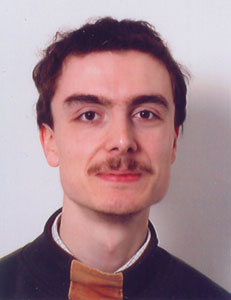
ATLAS e-News
23 February 2011
15 September 2008
Thijs Cornelissen
Nationality: Dutch

Thijs Cornelissen is a Dutch physicist in the ATLAS Data Processing (ADP) group, working on track reconstruction. In these busy days closer to the switch on of the detector, Thijs is writing code to make ready the ATLAS track software, but he also manages to find time to follow his other passion: flying.
Before switching allegiance to experimental physics, Thijs’ first steps were in the theoretical field. After completing his diploma thesis in lattice field theory at the Institute for Theoretical Physics of the University of Amsterdam, Thijs wanted to stay on to do his PhD. Back then, there was no place available for a research student over there and someone suggested to him to look for a vacancy at the High Energy Physics Institute of the Netherlands, where he found an open position. “The switch from theoretical to experimental physics was quite a shock for me at first, but now it feels like second nature,” says Thijs.
Since Thijs started his PhD in 2002, he has been working on ATLAS. For his thesis, he already worked on track reconstruction: “The work for my PhD was mainly to develop and test certain parts of the track reconstruction software. Soon we’ll see how it performs with real collision data from ATLAS,” Thijs says. “I’m really excited to see it working!”
In January 2007, Thijs changed Amsterdam for Geneva to join CERN as a fellow and since then, he has been working in the ADP group: “We have to make sure that we don’t lose track of half of the particles coming out from the collisions!” Thijs laughs. Although Thijs’ tasks at the moment are rather technical, he expects to start doing physics soon: “Once the experiment will be running smoothly, I hope to have the opportunity to detect interesting particles,” he says.
Thijs’ contract at CERN finishes at the end of this year, but he hopes to extend it and be able to work in Geneva long enough to see exciting physics discoveries coming out of the ATLAS detector. After the extension, Thijs would like to affiliate himself to a university in Holland or elsewhere and continue doing research on particle physics: “This is what I’m best at; unfortunately, the probabilities of getting a permanent position in research at the moment are low,” he concedes.
Since he moved to Switzerland, Thijs has been improving his skills on his other great passion. Once a week, Thijs escapes to the airport of Annemasse in France to learn how to pilot a single engine plane and, if everything goes to plan, he will obtain his license in less than a month. The passion for flying was inherited from his father, a medical doctor who used to fly to conferences on his own single engine plane and is still flying. These sorts of planes can go up to 3,000 m (10,000 ft) and fly more than three hours without need of re-fuelling: “My parents went to the island of Jersey from Holland for their honeymoon in one of those planes,” says Thijs. When asked about the danger of flying in single engine planes, he does not hesitate: “I don’t think it’s more dangerous than driving a car.”
While learning how to fly at Annemasse airport, Thijs has to put into practice one of his other hobbies, speaking foreign languages: “I have to speak French in the flying training, otherwise they would not allow me to take the exam,” he says. Besides French, Thijs can speak a total of six languages with different degrees of fluency; Dutch, English, German, French, Italian and Spanish: “At CERN, I like to send e-mails in the native language of the person I’m writing to.” No doubt, CERN is an unbeatable place to practise his interest. As his father used to do, one of Thijs’ dreams is being able to fly to physics conferences around Europe, piloting the plane himself. This fall, after obtaining his license, he hopes to start doing the same.

Cristina JimenezATLAS e-News |